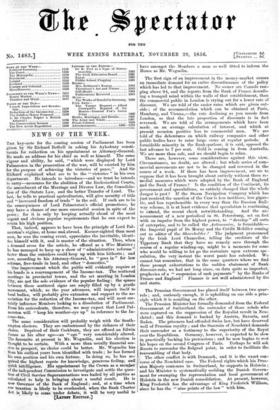NEWS OF THE WEEK.
THE key-note for the coming session of Parliament has been given by Sir Richard Bethell in asking his Aylesbury consti- tuents for reelection on his appointment as Attorney-General. He made an address for his chief as well as himself. The same vigour and ability, he said, "which were displayed by Lord Palmerston in the prosecution of the war, will be exerted by him for the purpose of achieving the victories of peace." And Sir. Richard explained what are to be the " victories " in his own department. He-intends to introduce—and we trust he intends, to carry—measures for the abolition of the Ecclesiastical Courts, -
the amendment of the Marriage and Divorce Law, the Consolida- tion of - the Statute Law, and the better Transfer of Land. The last, 1 he tells to practical agriculturists, will give security of title and "increased freedom of trade" in the soil. If such are to be the consequences of Lord Palmerston's official promotions, he may have a chance of one more successful session in spite of the peace ; for it is only by keeping actually ahead of the most urgent and obvious popular requirements that he can expect to retain his high position.
That, indeed, appears to have been the principle of Lord Pal- metston's regime, at home and abroad. Keener-sighted than most men, he sees the coming event, appreciates the inevitable, identi- fies himself with it, and is master of the situation. Thus, when a demand arose for the article, he offered as a War Minister ; he has managed to keep up a show of "administrative reforms " faster than the outsiders could keep up with him hitherto ; and now, according to his Attorney-General, he "goes in " for law reforms, free-trade in land, and other "domestics."
One improvement which the public will evidently require at
his hands is a rearrangement of 'the Income-tax. The scattered meetings in provincial towns, and the set meeting in London City, are not the sole evidence of the popular feeling : the spaces between those scattered signs are amply filled up by a gentle movement, which, as the year advances, will impart itself to local bodies, will probably give extension and support to the as- sociation for the reduction of the Income-tax, and will most cer- tainly influence Members looking to a dissolution Of Parliament. From his antecedents, therefore, we may expect that Lord Pal- merston will "keep his weather-eye up" in reference to the In- come-tax.
The same consideration will probably weigh with the South-
ampton electors. They are embarrassed by the richness of their choice. Deprived of their Cockburn, they are offered an Edwin James as his alter ego—an " ego " very considerably altered. The favourite at present is Mr. Weguelin, and his election is thought to, be certain. With a more than usually financial ses- sion in prospect; no choice could be better. Mr. Weguelin has from his earliest years been identified with trade ; he has formed his own position and his own fortune. In doing so, he has ac- quired the highest repute for knowledge, generous feeling, and quick intelligence. His appointment by the Crown as a mernher of the independent Commission to investigate and settle the ques- tion of Civil Service Superannuations was hailed by all parties as calculated to help in bringing about a useful result. He is now Governor of the Bank of England ; and, at a time when our taxation is likely to be overhauled, when the Bank Charter Act is. likely to come under debate, it will be very useful to
have amongst the Members a man. so well fitted to inform the House as Mr. Weguelin.


























